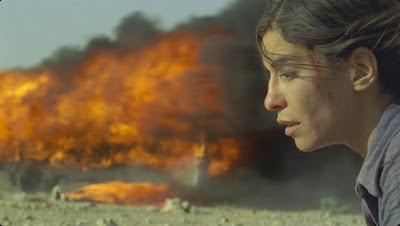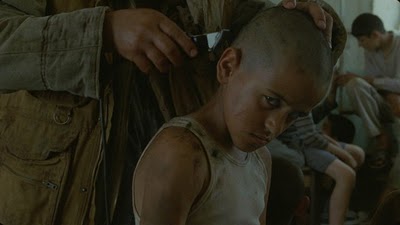Incendies: Lebanon Is Scorched, Burned and Blistered
To say that the Middle East has been scorched, burned and blistered by war is an understatement. In Incendies–a ground-breaking diaspora film, set in both present day Canada and in Lebanon in the recent past–we get to see in painful detail the intricacies of how the war burned many families into horrific mangled messes.
The idea of return is common among diaspora films of the last few decades. Usually the protagonist of the film returns to their family’s place of origin and discovers the rubble and ruins that have been vacated by their parent’s generation. Usually we do not see the atrocities that happened, but we are told that they are too terrible to talk about or to show. The protagonist walks around looking traumatized which, I have to admit, despite my devotion to these films, is part of the growing pains in the development of a genre.
Where Incendies distinguishes itself is in the crafting of a story that really is too terrible to tell and too terrible to witness. And then it makes us witness every terrible moment of it.
 |
| A cinematic moment. The image comes first and the explanation comes much much later. |
The brilliance of Incendies is not simply in the visceral moments of violence–the shock of a child being ripped from her mother’s arms before the mother is burned alive–it is in the crafting of a story that makes visible the back and forth of retaliation: like an equation where each variable, each action has a predictable and increasingly despicable reaction. Details were planted early in the film and later revealed their terrible significance. At the same time, the film avoids didacticism, and instead reaches for and finds mythological resonance.
 |
| Violence and pain become sources of empathy and identification for the audience. |
The film is based on a play written and directed by seasoned writer, actor and director extraordinaire, Wajdi Mouawad. He is of Lebanese origin and has received the highest accolades for his creative work in Canada. The Incendies stage play has traveled the world and has received rave reviews. Mouawad directed a film in 2004, Littoral, that was also an adaptation of a script he had written and directed for the stage. His initial transition to film was bumpy. Littoral was similarly a story of returning to Lebanon to burying a parent. Unfortunately, it was heavy in dialogue and the emotional tone of the film was forced. This time, Mouawad’s story has been better cinematically served by teaming up with director Denis Villeneuve. Villeneuve has spent the last decade working on the project of cinematic representations of violence. Even with an Oscar nomination in the Foreign Language category, Incendies is doing far better than its distributor had expected.
Seen through a feminist lens, the intersecting oppressions on the protagonist’s life do not simply come from the war planes overhead–which are never named, but are likely from Israel. The old world familial relationships that are what could loosely be referred to as pre-capitalist are further entrenched rather than displaced by war. The political, religious, and gender divides as well as ideas about honor and group loyalty are part of the web that entraps the protagonist. The story is written with non identical twins, a boy and girl, returning to Lebanon to search for their father and brother while uncovering their mother’s past. Each child is able to search in different spaces based on their respective genders, further revealing a splitting in the already fractured narrative.
 |
| The now classic diasporic subject returning to the ‘homeland’ and looking. |
The incredible violence we witness in the film is shot and edited with emotional rawness and, importantly, respect for women’s bodies. The rape scene is a good example; we are first told through dialogue that it is going to happen. We see the woman sitting in a chair and then see the rapist enter the room. The camera cuts to a close-up of her face as she is waiting, then cuts to a close-up of the rapist’s face as he looks at her. It cuts back to her on the ground crying. The editing implies the act of rape, and reduces the voyeuristic impact on the audience. Instead, we share in the victim’s anticipatory fear and in her pain afterward.
 |
| The protagonist is played by Lubna Azabal, a Moroccan actress who is a contender to be the next generation Hiam Abbas. Hiam Abbas is the Arab world’s Meryl Streep. |
The press releases claim that the film is set in an unnamed Arab country. The film itself evades realist details that would pin it to an exact location: the cityscapes are not Beirut, because they were shot in Jordan. The prison which is referred to as “in the South” is undoubtedly modeled after the notorious Khiam prisons in Lebanon, but in the film it is given a new name. The Nationalist party and its leader are fictional, although they occupied a similar position in the ideological landscape of Lebanon. License plates on cars are from several countries. The protagonist is modeled after Souha Bechara, a famous Lebanese freedom fighter who was in prison for assassination and sang through her solitary confinement. Unlike the character Nehal, the historical figure of Souha did not have children. Obscuring, renaming, and deliberate obfuscation are perhaps the historical equivalent of mythological strokes in narrative structure. The lack of geopolitical specificity is perhaps what allows the film to breathe the symbolic into the Lebanese situation. Make no mistake – some things are obscure, but the important details situate the film with utter literalism in Lebanon over the last few decades.
The film is traumatic to watch and perhaps cathartic too, especially for anyone from the region. I sobbed at least six times. The film allows a flood of memories to return, and stimulates after-film conversations about things people have repressed for years. In one of these conversations someone asked why the mother would bring the memories of violence onto her children. “They live in Canada, they don’t even speak Arabic, why do they need to unearth a painful and terrible history? Why not live in ignorant bliss,” she asked. What are the assumptions operating here? Do those in diaspora ever really live in ignorant bliss, when they are raised by parent(s) who have been through trauma, and war trickles down through their actions onto the children somehow? In Incendies, the children were raised without a father and without an extended family on either their paternal or maternal sides. The film asks us to think about whether their lives were ever really free of violence, even though the violence may have been displaced and unnamed. Traces of violence and the reality of unknown origins haunted them. The film suggests both that there is violence implicit in the return of the exile and the inevitability of that return. In this story, the boundaries between ‘here’ and ‘over there,’ past and present, families and strangers are found to be more permeable than many would like to think.
Vicky Moufawad-Paul is a curator, artist, film programmer, and the Artistic Director at A Space Gallery in Toronto. She earned a Masters of Fine Arts from York University, where she conducted research on the visual culture of Palestine. She was previously the founding Executive Director of the Toronto Arab Film Festival, and has worked at the Toronto International Film Festival Group. She was a member of the Visual and Media Arts Committee at the Toronto Arts Council, a founding member of the Advisory Board of the Palestine Film Festival, and a member of the Board of Directors at Trinity Square Video. Her writing has been published by Fuse Magazine, E-Fagia, the Arab American National Museum, and the Journal of Peace Research. She was also a contributor to the anthology Decentre: concerning artist-run culture/a propos de centres d’artistes (YYZ Books, 2008). Moufawad-Paul’s video art has been exhibited nationally and internationally.
